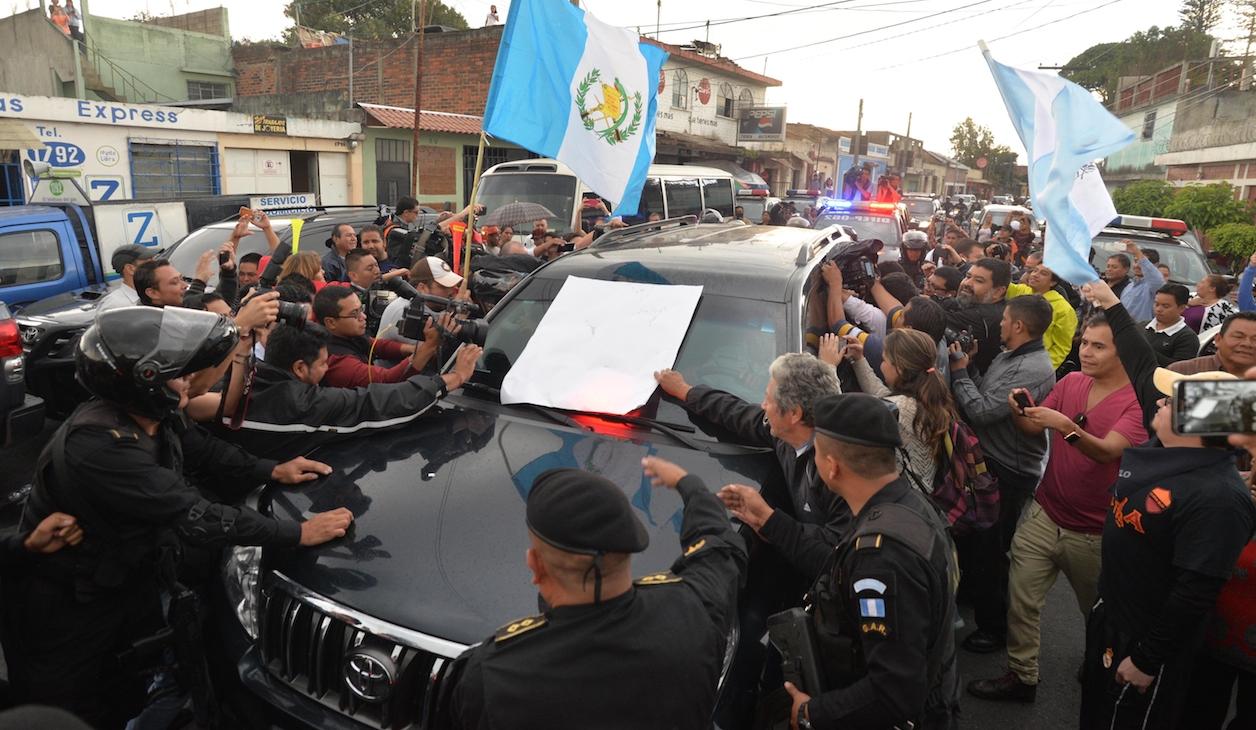This feisty UN agency put Guatemala’s president in jail for corruption
Demonstrators surround the vehicle carrying former Guatemalan President Otto Perez Molina in Guatemala City on September 3, 2015. Judge Miguel Angel Galvez ordered the detention Thursday of Guatemala's disgraced president, hours after he resigned his post amid a massive corruption scandal.
Update: A Guatemalan judge on Sept. 8 ordered fallen President Otto Perez Molina to stand trial over a corruption scandal. That followed Sunday's election: the candidate who won the most votes — a comedian named Jimmy Morales — will now head to a second round against the runner-up in October.
GUATEMALA CITY — Guatemalans took to the streets on Thursday, armed with flags, fireworks and vuvuzelas. So spirited was the celebration that it might have seemed this small Central American country had won the soccer World Cup.
In fact, they weren't there to cheer a sports victory, but rather the resignation of President Otto Pérez Molina over allegations of corruption as well as the subsequent arrest warrant issued against him, his appearance in a lengthy court hearing, and finally his transfer to the Matamoros prison on a military base.
What was celebrated, in other words, was the swift and decisive action of Guatemala's judicial institutions. To a country chronically plagued by corruption, violence, oppression and impunity, that was nothing short of revolutionary.
“We have won a great moral victory, and without weapons," says Anibal Montaroso, 60, an engineer. “We're not going to tolerate dishonest people anymore, and everybody knows it now.”
Many Guatemalans hope the resignation and jailing of Pérez Molina heralds a new age, in which corruption ceases to be tolerated and apathy toward impunity becomes a thing in the past.
Regardless of whether that will happen, there is one thing almost everyone agrees upon: This month’s historic events could not have happened without a United Nations-backed agency known as CICIG.
CICIG is the Spanish acronym for the International Commission Against Impunity in Guatemala. It was established in 2006 to strengthen the country's weak judicial institutions in the fight against corruption and organized crime. After a careful start with limited involvement in several sensitive cases, this year has proven a watershed moment for the agency.
Led by Iván Velázquez, a stoic Colombian prosecutor, CICIG has made a series of stunning revelations that sent shockwaves through Guatemala's political system, helped jail dozens of high-profile officials and businessmen, and eventually even toppled both Pérez Molina and his former Vice President Roxana Baldetti.
It was CICIG that, in April, first revealed the existence of “La Línea” — a corrupt network of officials who pocketed millions of dollars by defrauding the customs service. Pursuing every lead, the agency's investigations eventually led to Juan Caros Monzón — the still-at-large secretary of Vice President Baldetti — then the vice president herself, and finally even the president.
Motivated by CICIG's relentless sleuthing, Guatemala's prosecutors began acting on the mounting evidence of fraud and corruption. Dozens of prominent officials and businessmen have been arrested since April. Vice President Baldetti resigned in May and was subsequently jailed.
As CICIG and law enforcement agencies formed a common front, Guatemalans began to finally believe that the country's powerful business and political elite are no longer above the law. In the wake of the initial revelations about La Línea, thousands began to protest every week in front of the National Palace. In recent months they were joined by the Church, farmers' organizations, unions and even CACIF, Guatemala's most powerful business organization.
“Entities like CICIG are necessary in Latin America," says Nineth Montenegro, a congresswoman and member of the congressional committee that earlier this week recommended lifting Pérez Molina's immunity from prosecution. “It is needed, because in these countries there are no independent institutions. The state has been penetrated by organized crime, you need something that can operate outside the state.”
Indeed, so astonishing is CICIG's success that inhabitants of neighboring countries are now looking to Guatemala as a possible model. In Honduras — whose President Juan Orlando Hernández has faced mass protests for months over a corruption scandal similar to La Línea — protesters have openly demanded the establishment of a CICIG-like agency, as have residents of El Salvador.
“Central America is like a series of communicating vessels. People in El Salvador and Honduras have seen what CICIG has done in Guatemala, and now they want one of their own,” says former Guatemalan President Vinicio Cerezo (1986-1991), who now heads a foundation aimed at increasing regional cooperation in Central America. “It's likely that, eventually, a regional CICIG will develop, or perhaps one with dependencies in all three countries.”
Experts are quick to point out that such a development may still be a long shot, however. CICIG's current mandate expires in 2017. The results of Sunday's presidential election may even herald the end of the agency. Manuel Baldizón, a conservative, has been openly hostile toward both CICIG and its commissioner Iván Velázquez in recent months. He currently polls second and will likely head into October's run-off.
Moreover, CICIG is still a long way from reaching its goal of strengthening Guatemala's institutions enough to make its presence redundant.
“They are still needed at the moment," says Cerezo, the former president. “They have investigative tools at their disposal that Guatemala's institutions, its judges, simply don't. You can't take out the criminal structures that penetrated the state from one day to another, so I feel CICIG's mandate should last for at least another two years.”
Our coverage reaches millions each week, but only a small fraction of listeners contribute to sustain our program. We still need 224 more people to donate $100 or $10/monthly to unlock our $67,000 match. Will you help us get there today?
